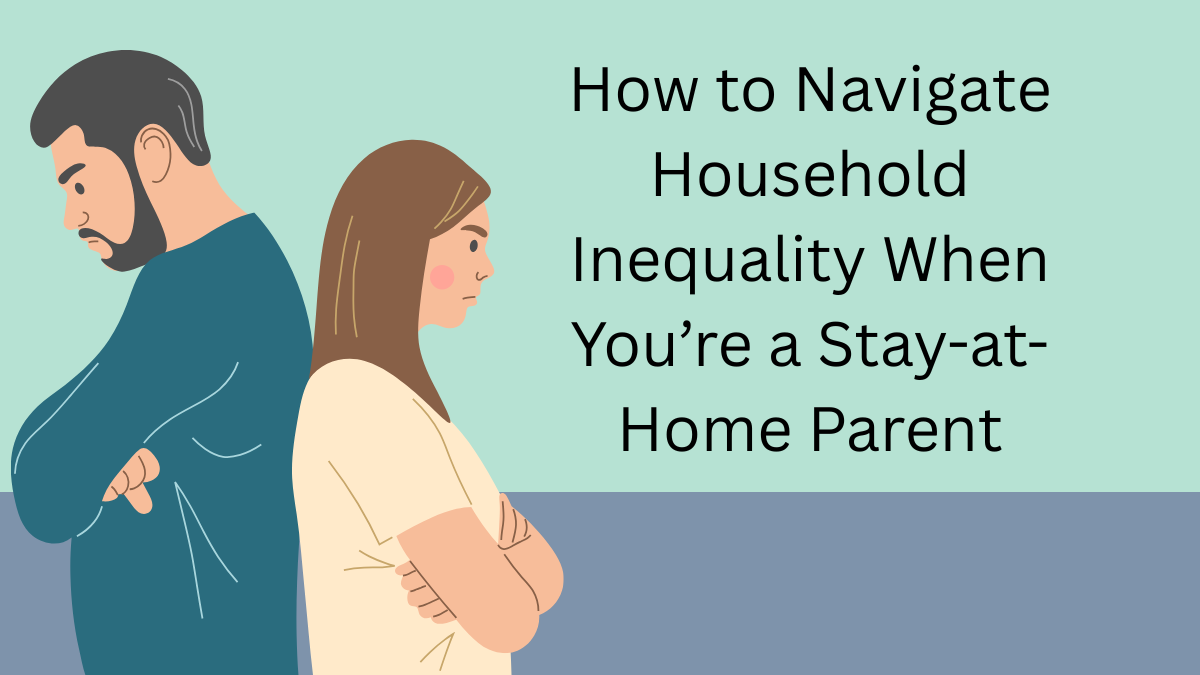
“You Wanted the Children”—The Unspoken Weight of Those Words

Table of Contents
The Real Value of Unpaid Household Labour — and How to Create a Fairer Partnership at Home
Being a stay-at-home parent is a full-time role with its own set of challenges, demands, and rewards—yet it is often undervalued, especially when it comes to the division of household chores and invisible labour. This household inequality can cause serious strain on relationships.
In the UK, unpaid household work is estimated to be worth around £1.2 trillion a year—almost two-thirds the size of the formal economy—yet it still carries little recognition in many households. That figure represents the economic value of unpaid household labour and highlights why these conversations matter.
If you’ve heard phrases like, “You chose to stay at home, and now, because it doesn’t suit you anymore, you want to put more on me. I earn the money and need downtime!” you’re not alone. Many parents—most often mothers—experience this imbalance.
1. Reframe the Conversation Around the Value of Unpaid Household Labour
When your partner claims they “earn the money” and “need downtime,” acknowledge their stress but also underline the fact that your contributions are just as valid. Being a stay-at-home parent is not “choosing an easier path”—it’s taking on unpaid work that supports the entire family.
Explain that household chores, childcare, and emotional labour don’t stop just because you’re at home. Both of you are contributing to the family in different ways, and each deserves recognition.
2. Make the Invisible Labour Visible
Invisible labour includes tasks like:
-
Planning meals
-
Organising schedules
-
Managing school admin
-
Remembering birthdays
-
Tracking family appointments
These tasks are time-consuming and mentally exhausting. Research shows women still carry most of the mental load in households, even when both partners work. Pointing out these unseen responsibilities can help your partner understand that unpaid work is still work.
Reception Class Preparation: Essentials for Parents
3. Be Specific When Asking for a Fairer Split
Vague requests like “I need help” are easier to dismiss. Instead, identify exact tasks to share:
-
“Can we alternate who plans the weekly meals?”
-
“Can you take over school pick-up one day a week?”
Having a concrete list supports a fair division of household labour and helps highlight which tasks can be redistributed.
Reframe the Language Around Household Responsibilities
When you ask for “help,” it can unintentionally suggest that household tasks are your job by default and your partner is doing you a favour. This mindset fuels inequality. Instead, shift to language that assumes joint responsibility for running the home.
Try these approaches instead of saying “help”:
-
Use “share” or “take responsibility for”
-
“Can we share the bedtime routine?”
-
“Can you take responsibility for school drop-offs on Tuesdays?”
-
-
Talk in terms of “our” tasks
-
“We need to get the laundry done—can you do the wash while I make dinner?”
-
“We’ve got school forms due tomorrow—can you fill them in?”
-
-
Assign roles rather than requesting favours
-
“You do the kitchen clean-up, I’ll do the packed lunches.”
-
“You’re on laundry duty this weekend, I’ll handle the grocery shop.”
-
-
Make it part of the household system
-
“Part of running the house is keeping track of bills—can you take that on?”
-
“Dinner is part of our nightly routine—can you do Tuesdays and Thursdays?”
-
-
Use “swap” language for flexibility
-
“Can we swap jobs tonight? You take bedtime, I’ll do the dishes.”
-
“I’ll handle homework if you do the laundry.”
-
Why it matters:
This shift in language reinforces that both partners are equally responsible for the home. It moves you away from a dynamic where one partner is the default manager and the other is “helping,” and toward one where both are actively participating in family life.
4. Redefine “Downtime” for Both Partners
Both partners need rest and recovery time, but it should be equitable. If one person’s downtime happens while the other is still doing chores, resentment will grow. Create schedules where both of you get uninterrupted time to recharge.
5. Approach the Household as a Team Project
Think of your home as a shared enterprise where every role—paid or unpaid—has equal importance. When both partners contribute to the running of the household, it builds mutual respect and prevents one person from feeling undervalued.
6. Get External Support if Needed
If your partner is unwilling to discuss a fairer division of household chores, consider a relationship counsellor or mediator. An impartial voice can open up the conversation and help each partner see the other’s perspective.
7. Remember Your Worth
Stay-at-home parents provide unpaid labour that keeps families running smoothly. As Eve Rodsky, author of Fair Play, says:
“When you treat your home as your most important organisation, you start to realise that every role—paid or unpaid—deserves clarity, respect, and shared responsibility.”
Her message reinforces that parenting responsibilities and household labour are not secondary to paid work—they are equally vital to a family’s success.
Conclusion: Recognise the Economic and Emotional Value of Unpaid Household Work
Unpaid household labour has both economic value (billions of pounds annually) and profound emotional importance. When the workload is distributed fairly, families thrive. By making invisible labour visible, setting boundaries, and reframing the conversation, couples can build a more equal partnership where both paid and unpaid work are valued.

I am a preschool and primary school teacher and mum to 3 children. I have been involved in education since 1997 and have trained in a variety of educational specialist areas. It is with this expertise that I write articles to help parents and educators provide quality learning experiences for the children in their care.




